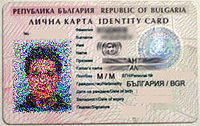- Bulgarian identity card
-
The Bulgarian identity card (Bulgarian: Лична карта, Lichna karta) is a compulsory identity document issued in Bulgaria. The document is issued by the police on behalf of the Ministry of Interior and is the main form of identification on the territory of the Republic of Bulgaria. All Bulgarians are obliged by law to carry their identity cards with them at all times and are subject to fines should they not.
Since January 1, 2007, the Bulgarian identity card can be used to travel within the European Union.
Contents
History
Bulgarian identity card лична карта in Cyrillic alphabet (or "lichna karta" in Latin transliteration) is first issued and is compulsory after turning the age of 14. The new Bulgarian ID cards were introduced in 1999. They follow the general pattern in the EU and replaced the old, Soviet-style "internal passports", also known as "green passports". It is worth mentioning that during the socialism period (1945–1989), to receive an "international passport", especially one allowing to travel to a Western country, was considered an achievement. Not all Bulgarian citizens had the right to travel abroad, and those who travelled outside the Soviet bloc underwent strict investigation for possible links with political enemies of the regime. Since 29 March 2010 [1] new Bulgarian identity cards were introduced with embedded chip with personal data.
Physical appearance
The physical appearance of the Bulgarian identity card is similar to that of a credit card, the identity card is plastic and rectangular in shape. On the left side is the photograph of the bearer. On the top edge of the card, the name Republic of Bulgaria is available in two languages, Bulgarian (Cyillic) and English, written with big letters, below, the name of the card is available in the same two languages and also written with big letters. The middle part of the flag of the Republic of Bulgaria and the Coat of Arms of the Republic of Bulgaria are also displayed on the identity card.
Furthermore, the following information is contained on the front side of the card:
- The unique 9-digit ID number of the card
- The cardholder’s full name, sex, and date of birth
- The cardholder’s uniform civil number (Bulgarian: единнен граждански номер; abbreviated ЕГН, EGN): a unique 10-digit number that serves as national identification number
- Date of expiry of the card
- Cardholder’s signature
The back side of the identity card contains the cardholder’s family name, place of birth, permanent address, height, and eye color, as well as the place where the card was issued together with the date of issue. At the bottom there is string of letters and numbers that is consistent with and representative of the rest of the information on the card.
Obtaining an Identity Card
In order to be issued an identity card, one needs to fill in a form, which should be taken to the in the Identity Documents and Passport Regime Units with the District Police Stations. The forms could be obtained at all District Police Stations. Together with the completed application, the person should also supply two recent photographs (taken in the last six months) as well as a copy of passport. When applying for the first time, a copy of the birth certificate should also be provided.
For people ages 14 to 18 years, the identity cards are valid for four years, while citizens ages 18–58 are issued cards with 10-year validity; citizens over 58 years old are issued identity cards with no expiration date.
See also
- Citizenship of the European Union
- Bulgarian passport
- Bulgarian nationality law
- Uniform civil number
- Driving licence in Bulgaria
- Visa requirements for Bulgarian citizens
- Visa policy of Bulgaria
- List of identity card policies by country
- An application on the Ministry of the Interior’s website that checks identification card numbers for validity
References
External links
National Identity cards By continent AfricaAsiaPeople's Republic of China (Hong Kong SAR • Macau SAR) • India • Indonesia • Iran • Israel • Malaysia • Pakistan • Philippines • Saudi Arabia • Singapore • Sri Lanka • South Korea • Republic of China (Taiwan)1OceaniaEuropeAlbania • Austria • Belgium • Bosnia and Herzegovina • Bulgaria • Croatia • Cyprus • Czech Republic • Estonia • Finland • France • Germany • Gibraltar • Hungary • Italy • Lithuania • Macedonia • Malta • Moldova • Montenegro • Netherlands (BES) • Poland • Portugal • Romania • Serbia (Kosovo1) • Slovakia • Slovenia • Spain • Sweden • SwitzerlandNorth AmericaSouth AmericaNotes 1 Partially unrecognised and thus unclassified by the United Nations geoscheme. It is listed following the member state the UN categorises it under.
Biometric identity cards ( ) are indicated in italics.Categories:
) are indicated in italics.Categories:- Government of Bulgaria
- National identity cards by country
Wikimedia Foundation. 2010.


